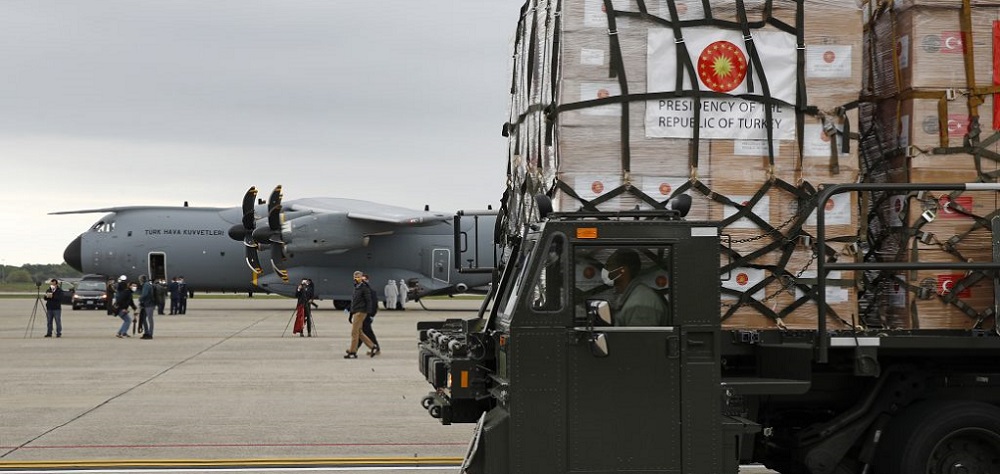Alwaght- The spread of the COVID-19 worldwide has been effecting the political relations among the world countries, as it impacts all aspects of human life. On the one hand, the pandemic forced border closures and on the other hand reduced the visits of the diplomats to foreign countries. At the same time, the pandemic created a necessity for all to cooperate so that they can weather the crisis.
Meanwhile, some countries try to shift the COVID-19 threat into an opportunity to reach their political and economic interests and goals.
In one important example, the Turkish President Recept Tayyip Erdogan on April 28 sent a shipment of medical supplies to the US to help it fight the coronavirus. The second plane was sent on Thursday.
Sending the medical supplies to the US comes while differences between Washington and Ankara remain at their highest level, perhaps unprecedented in the years that followed WWII. In his letter regarding the aid, Erdogan told Trump that the “recent developments in our region once again highlight the significance of the US-Turkey alliance in its strongest form.”
These comments by Erdogan come while regional developments, especially over the past few months, exhibited the conflict of the American-Turkish interests. The deep division with the Trump administration over the Syrian Kurds, the Turkish cooperation with Russia, and also Ankara’s close relations with Tehran amid Washington’s “maximum pressure” campaign against the Islamic Republic of Iran all disclosed the Turkish-American clash of interests.
But why is now the Turkish leader talking about the necessity of cooperation between the US and Turkey this hyperbolically? Why does he show this unprecedented flexibility in his policies towards the White House?
Saving grand White House backer and taking Washington to the side of Ankara policies
It can be daringly said that never in the White House and among the American lawmakers has been such an excessive antipathy against Turkey as it is now. After Erdogan’s Turkey moved close to Russia in 2016 and took a foreign policy path running counter to that of the US in the West Asia region, a kind of opposition to Ankara has engulfed the American approach to the NATO ally. Despite that, President Donald Trump appears to be the only one in the US policy-making layers who still defends continuation of a strategic alliance between the two sides.
Over the past few months, the US lawmakers made several efforts to impose economic sanctions on Turkey. Some influential senators called on the Trump administration to reduce the diplomatic relations level with Ankara. For example, on December 12, the Congress approved recognition and condemnation of the Armenia genocide that was committed by the Ottoman Empire, the parent state of modern Turkey. Despite the lawmakers’ moves to put strains on Turkey, Trump did not take any serious moves towards sanctioning Ankara.
It seems that Trump is the only man in the circle of the US decision-makers who seeks relative toleration of Erdogan and his policies and still sets hope on normalizations of ties between the two NATO members.
Still, a recent statement by Trump on the anniversary of the Armenian genocide rendered Erdogan worried about the prospects of ties with Washington. In his statement on April 24, Trump used “Meds Yeghern”, meaning great crime, a term used by the Armenians to describe the mass displacement and massacring of the Ottoman Empire. The Turkish government got a sense that it is losing its last and biggest supporter at the White House.
Aware of the psychological features of Trump, the Turkish strategists tried to win back his support to Ankara by sending two medical aid shipments to the US as the country remains the hardest-hit among the world countries struggling with the infectious disease. The Turkish leaders know very well that once the Democrats represented by Joe Biden assume the White House, Ankara will lose its chance with the US. A Democratic-led administration in the new situation will adopt an anti-Turkish approach. Actually, there will be no person leading the White House like Trump based on whose anti-system and anti-collective mindset logic Ankara can push forward the frayed relations with Washington.
Erdogan and other Turkish politicians know that Trump has a severely emotional character and is easily influenced by various actions. So, at a time the virus’ fast and unchecked spread poses a serious challenge to Trump stay at the White House and at the same time massive criticism target his way of handling the coronavirus crisis, by sending the medical equipment Turkey on one side wants to tell Trump that it wants to see him pass the difficult situation and win the presidential election and on the other side Erdogan seeks Trump’s advocacy as Turkey is stuck in Syrian Idlib crisis and growing chill with the US can sink it deeper in the Syrian crisis.



























